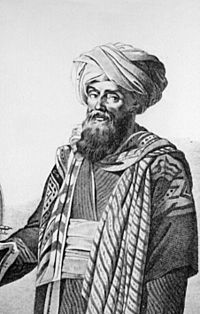Ali Bey el Abbassi facts for kids
Quick facts for kids
Ali Bey el Abbassi
|
|
|---|---|

The illustration of "Ali Bey" from the book of his travels
|
|
| Born | 1 April 1767 |
| Died | 30 August 1818 Syria, Ottoman Empire
|
| Occupation | Explorer |
Domingo Francisco Jorge Badía y Leblich (1767–1818) was a Spanish explorer, soldier, and spy. He is better known by his fake name, Ali Bey el Abbassi. He lived in the early 1800s and is famous for his travels. He explored many parts of North Africa and the Middle East. He even saw the Saudi army take over Mecca in 1807.
Contents
Who Was Ali Bey?
Domingo Badía was born in Barcelona, Spain, on April 1, 1767. He received a good education. He spent a lot of time learning the Arabic language. He also studied the traditions and ways of life in Arab countries. This helped him prepare for his future adventures.
His Amazing Travels
From 1803 to 1805, Badía traveled through Morocco. He used the fake name Ali Bey el Abbassi. He pretended to be a descendant of the Abbasid caliphs, who were important leaders long ago. The king of Morocco even welcomed him!
After Morocco, he went to Mecca. This was a very important religious city. He went there to perform the hajj, a special pilgrimage for Muslims. On his way, he stopped in places like Tripoli, Cyprus, and Egypt.
By pretending to be a Muslim, he could visit places that were usually closed to non-Muslims. These included Mecca and the Cave of Machpelah in Hebron. On his way back, he visited Jerusalem and Syria. He finally reached Constantinople in the autumn of 1807. There, some people started to suspect he was not a real Muslim. So, he quickly left and went to French-occupied Spain.
Life After His First Journey
When he returned home in 1807, he supported King Joseph I. Joseph was the brother of Napoleon Bonaparte. Badía was given important jobs in Segovia and Cordoba.
After the French army lost a big battle in 1813, King Joseph left Spain. Badía then moved to France. In 1814, he wrote a book about his travels. It was published in French and later in English in 1816. People were very curious about "Ali Bey" because the book was written as if he was a real Muslim traveler.
His Final Journey
In 1818, he started another journey. This time, he used the name Ali Othman. He suddenly died in Aleppo on August 30, 1818.
His Lasting Mark
Today, some streets are named after him. For example, there is Carrer Alí Bei in Barcelona and Tangier. A statue of him in Tangier was later removed.
See also
 In Spanish: Domingo Badía para niños
In Spanish: Domingo Badía para niños
- French Campaign in Egypt and Syria
 | Percy Lavon Julian |
 | Katherine Johnson |
 | George Washington Carver |
 | Annie Easley |

